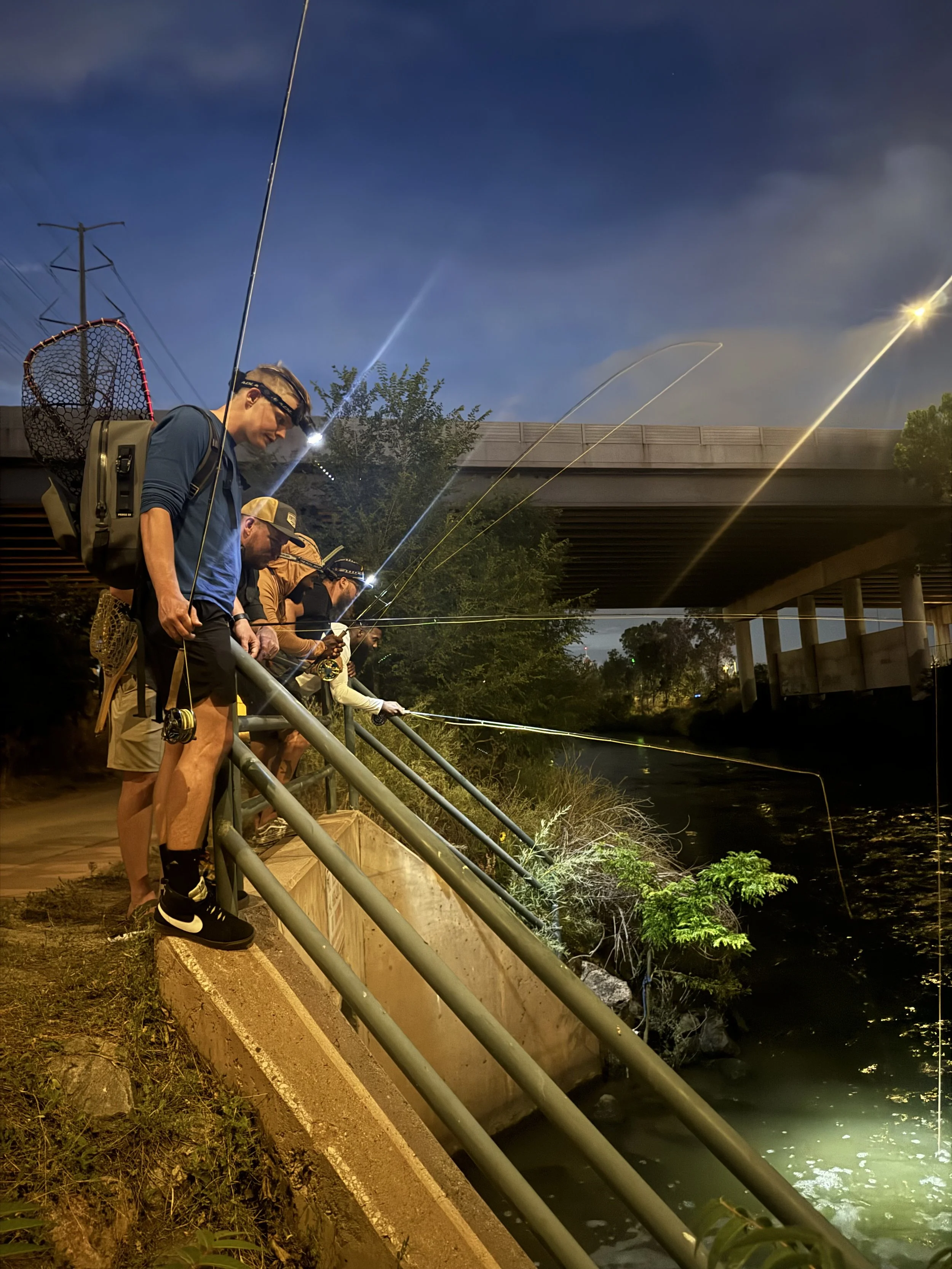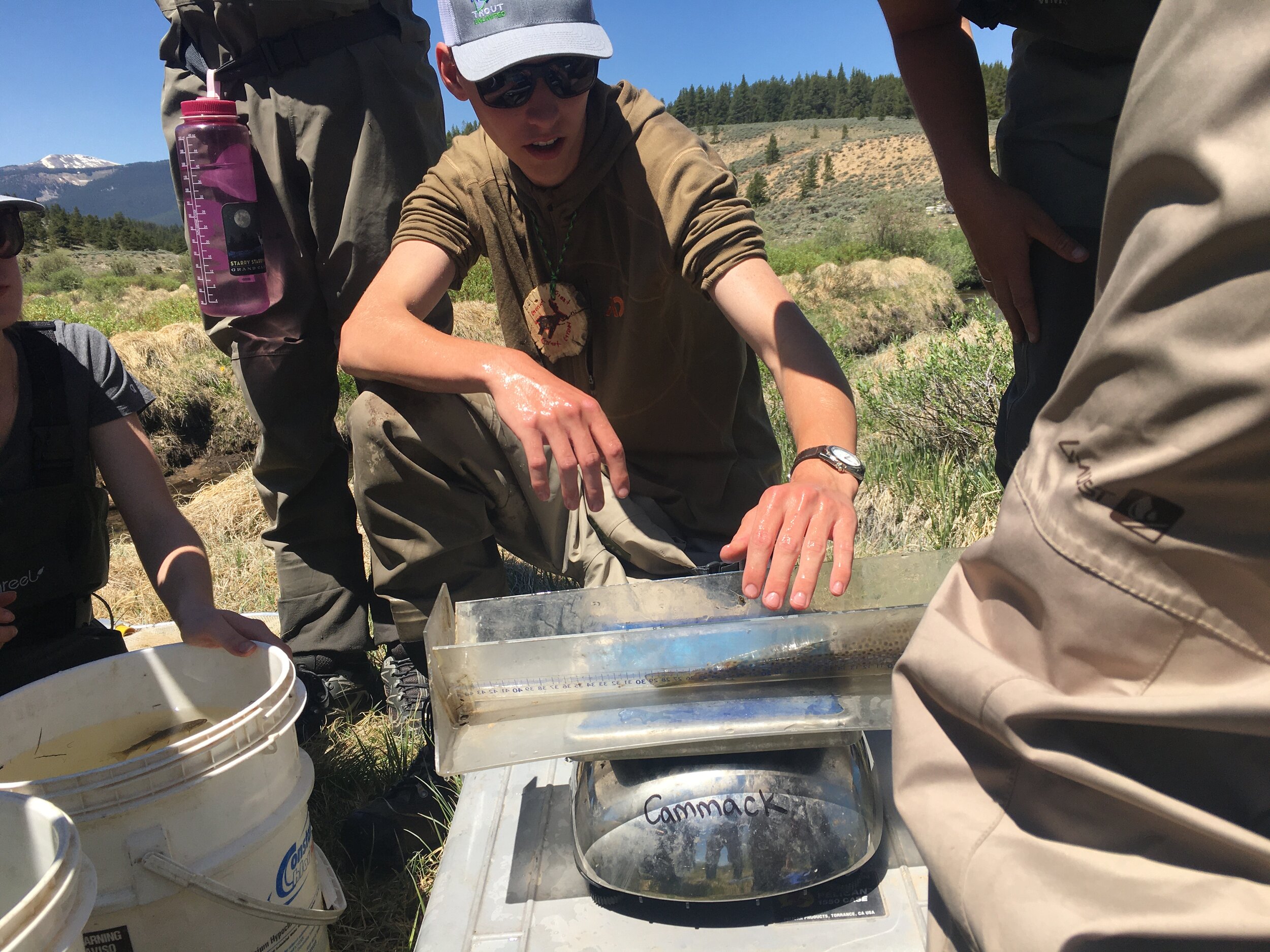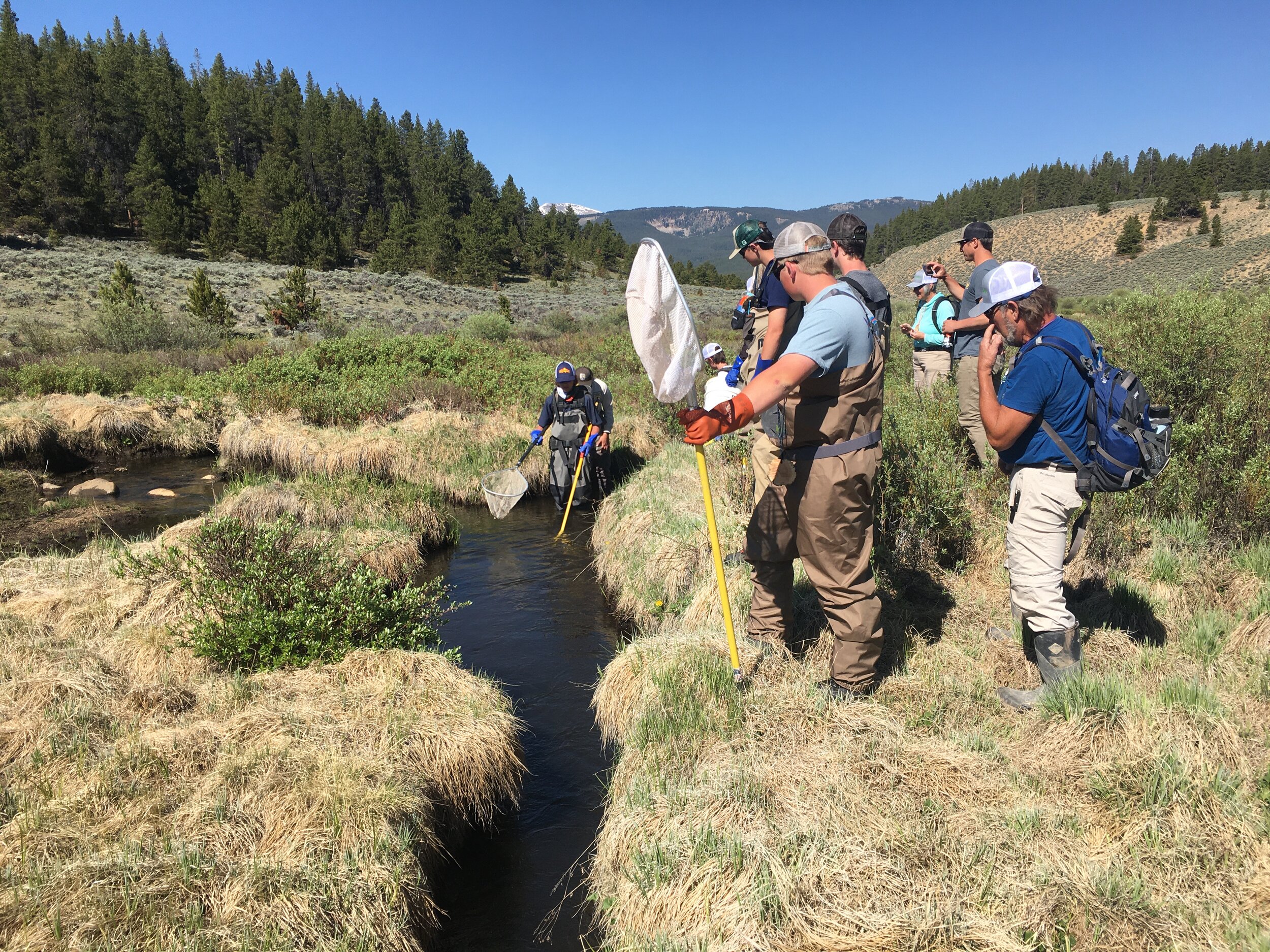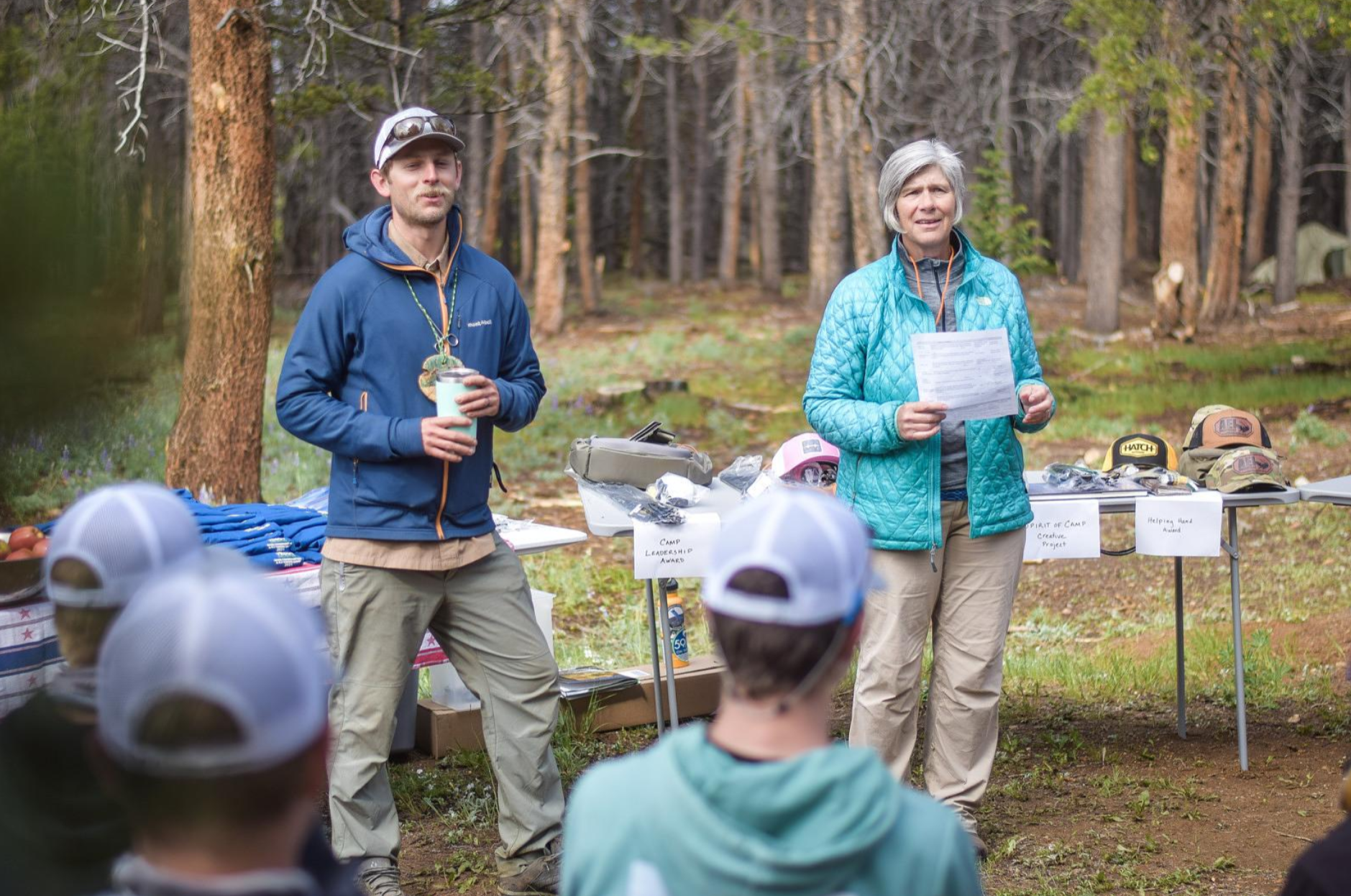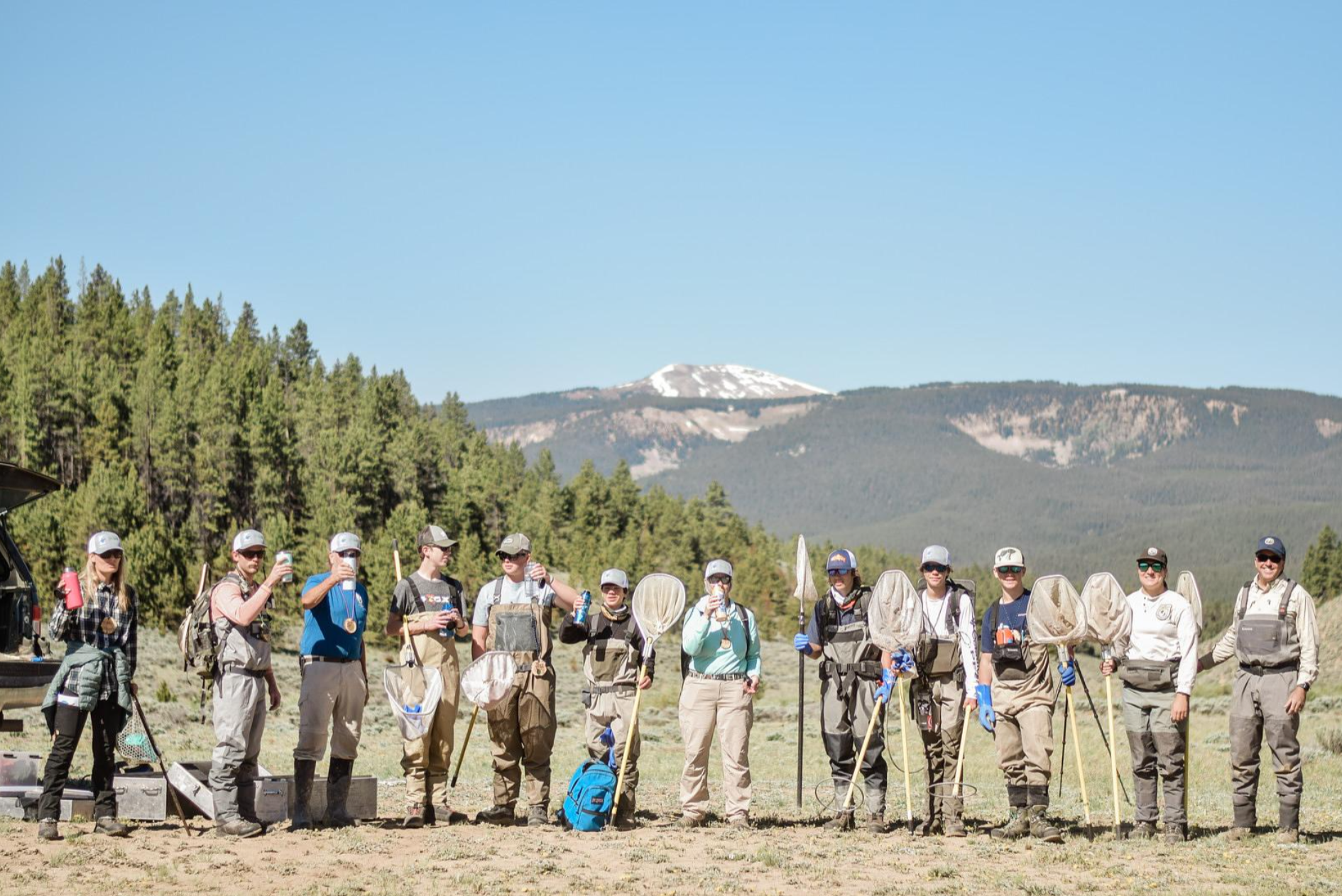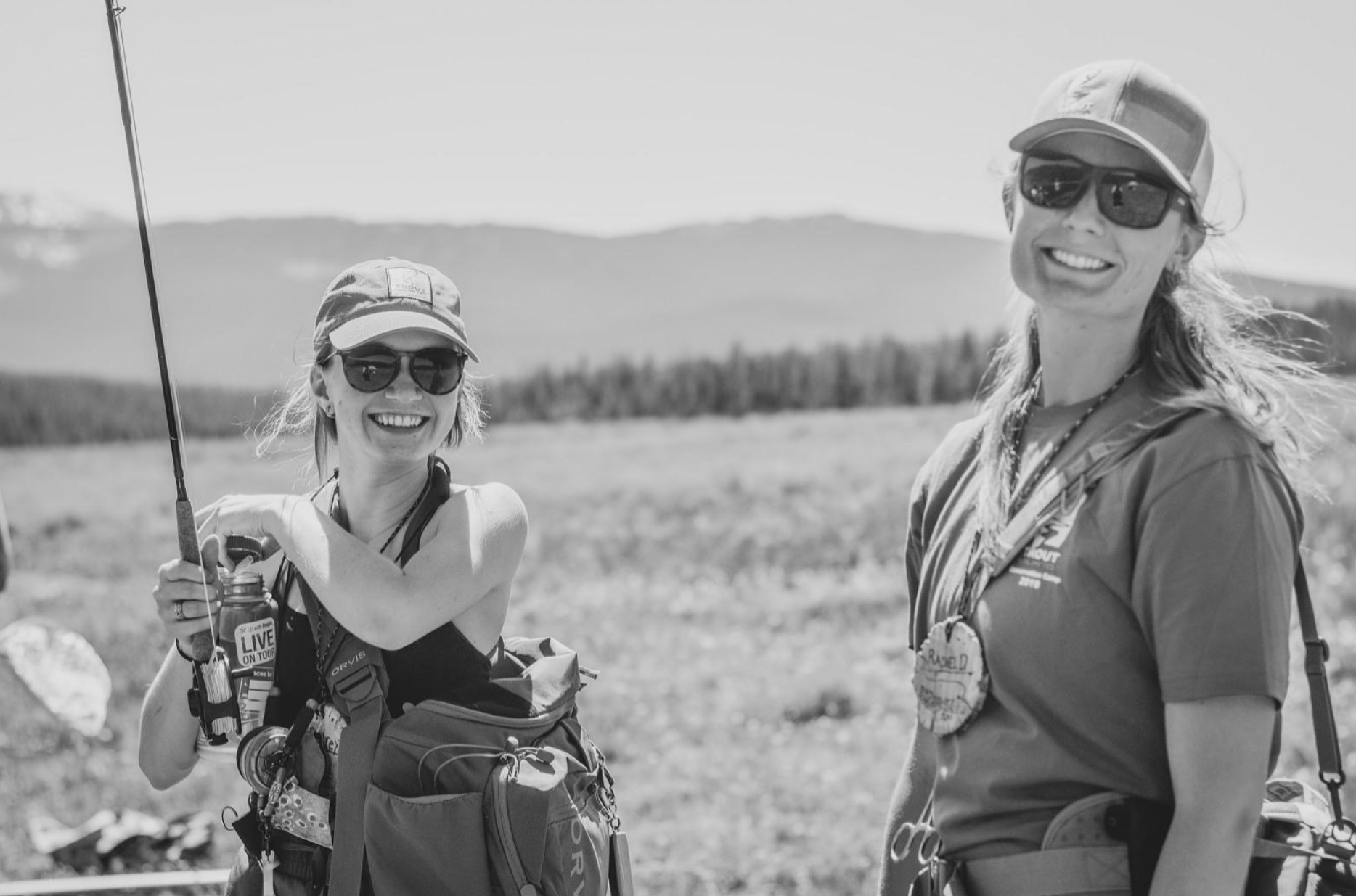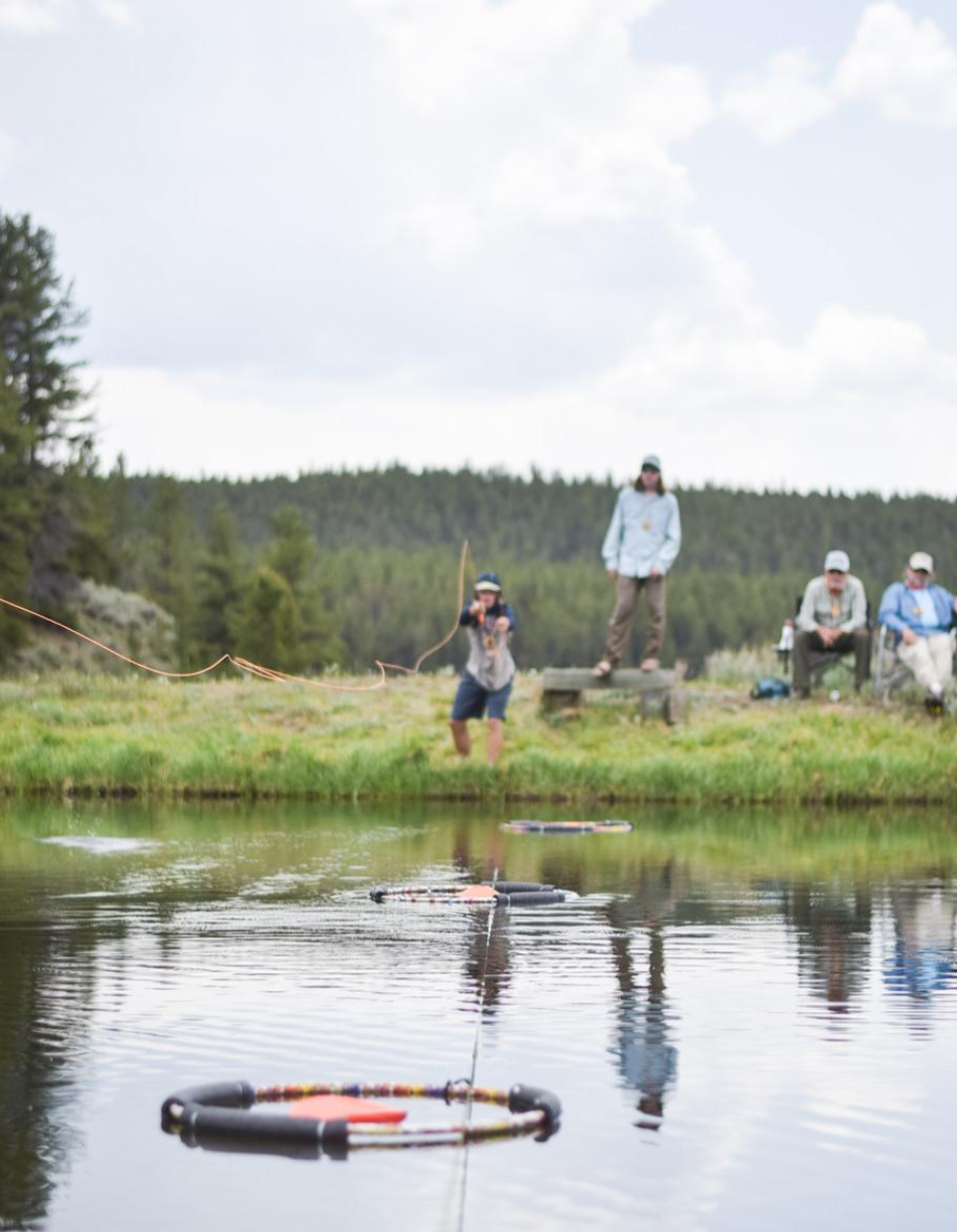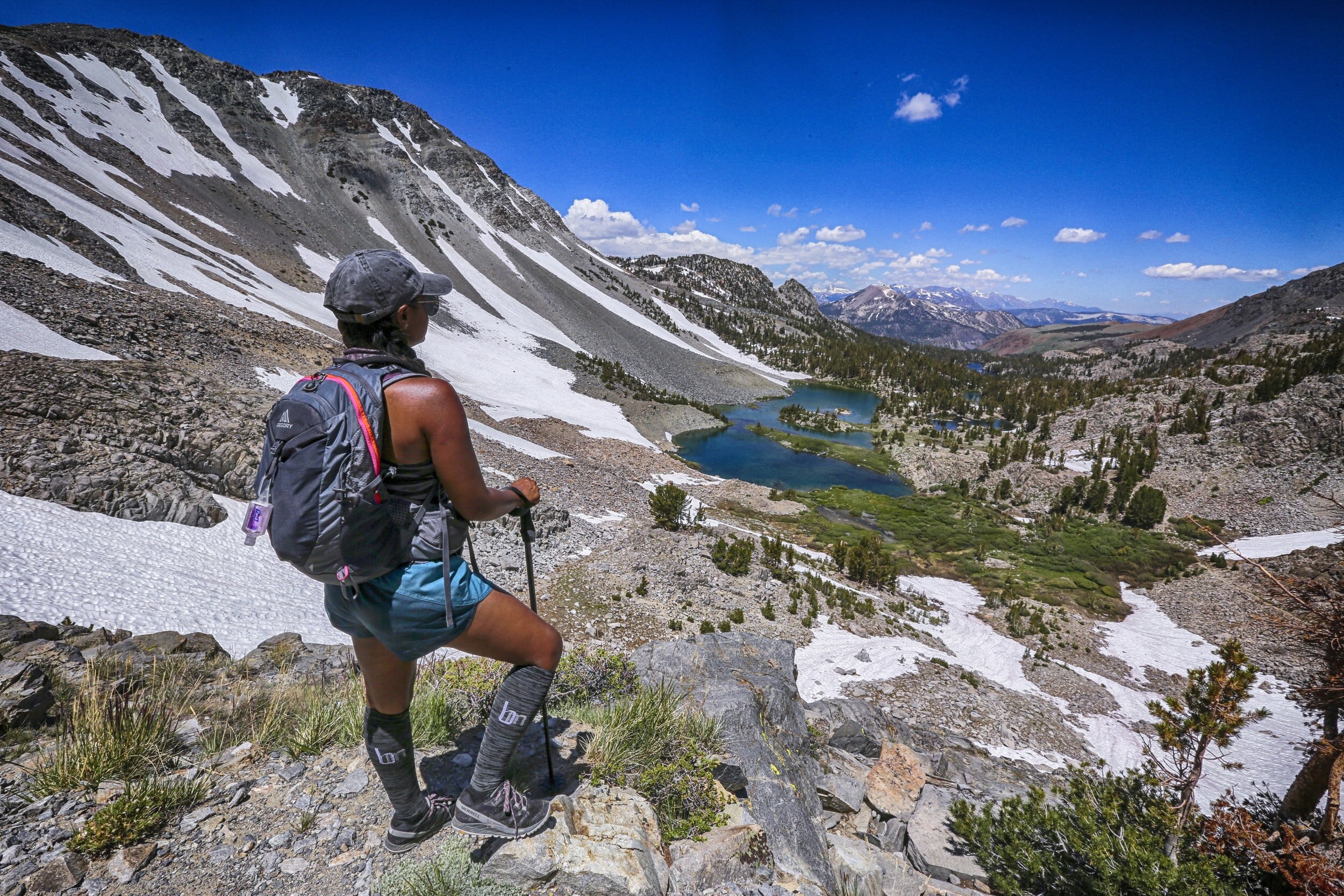We’re excited to bring you a new report looking back at another great year! Thank you taking the time to see what we have accomplished and are looking forward to.
Submit your opposition to the Zephyr gold mine near Grape Creek
DEADLINE: Wednesday, September 1, 2021
To learn more about the proposed gold mine please read The Colorado Sun article.
For the latest information on this issue please visit https://www.savefremontcounty.org/. That is the website for the main group opposing the application for a new gold mine near Grape Creek, by Canon City. Our chapter has filed an opposition letter with the Fremont County Commissioners and also with the DRMS.
Sample letter:
I am writing to voice my opposition to the Zephyr Minerals application for a gold mine near the Grape Creek wilderness. I am concerned that this proposed mine poses too high of a risk to the neighboring creek and river. As an avid angler, I fish the Arkansas river below the Grape Creek confluence, and am worried about any possible water contamination and pollution. A few of my particular concerns:
WATER: The mine site, at 6,500 feet elevation, is 1,000 feet higher elevation than Grape Creek and the Arkansas river. It is upstream from the water plant intake for Fremont County. Any discharge from mining operations will find its way to the aquifers underground and/or the water flows. The mining operation would use approximately 65 million gallons of water per year and an unspecified amount of chemicals. With the site just 1,000 feet above the Grape Creek and Arkansas River area, this creates the potential for pollution of the water for present and future generations. The demand on underground aquifers has been estimated in the permit as “insignificant” but there is no monitoring or measures to be sure that the demand is having an “insignificant” impact.
FIRE RISK: Zephyr claims: “Not a single forest fire in the USA has been traced back to or been attributed to a modern mining operation.” and “The mine operation will manage process water and storm water. The mill process water will flow through a closed recycling system with very little discharge if any.” How many unexpected disasters have resulted from mining? It is certainly possible that the proposed Dawson Gold Mine could be yet another disaster in the making.
The permit is non-specific in the amount of water reserved for fire mitigation. It states “sufficient.” There is no Fire Protection plan associated with the current application. How could government entities approve the permit without an assurance of being able to mitigate a fire before it becomes a wildfire? The mine location is in a juniper forest, semi-arid climate which is essentially a tinder box. There would be “approximately 13,000 pounds of explosives onsite for up to a week of blasting activity… replenished weekly”. Adding explosives to an area already a tinder box for a wildfire could create a wildfire that wipes out the entire region particularly without an established fire protection plan. Why incur this risk?
RECLAMATION FUNDS: Only $261,813 has been reserved for reclamation of the “affected area” when the mine shuts down. For 82 acres? With no inflation factored into the figures? Even without structures, concrete pads, holding ponds, etc., 82 acres could not be professionally landscaped for $261,813. The reclamation allocation is too small and is not adjusted for inflation.
EMERGENCY FUNDS: There is no allocation funds to address an unexpected fire, explosion, pollution leakage, or power outage. Zephyr has to seek additional funding to operate a mine or sell off to a larger concern. Without a requirement for a “problem reserve”, where would money come from to mitigate a significant problem?
The application does not have sufficient assurances that a long-term disaster will not happen or that short term significant problems can be resolved. I am strongly opposed to it. I respectfully request that you deny this application.
To submit the letter, you’ll need to follow these steps:
Go to the DRMS website: https://dnrlaserfiche.state.co.us/Forms/DRMS_Comment
set “Contact Type” to “Individual”
enter your name in “Persons Represented” field
enter your name, address, email, phone number in the appropriate fields
set “Connection to Operation” to “Concerned Citizen”
In the “Comment/Objection Narrative” enter the sample text above and edit as desired.
“Permit Number” is M2021046
“County” is “Fremont”
“Site Name” is “Dawson Gold Mine”
Permittee/Operator Name” is “Zephyr Gold USA Ltd”
Select “Objection”
That’s it — click “Submit” and you should receive an email confirmation that your object was submitted.
It should look like this:
August Currents: A voice for Colorado's rivers
This month’s Currents features stories such as:
Multiple volunteer opportunities around the state
Getting the Blue back to GOLD
Rendezvous Save the Date and Award Nominations are open
Macro of the Month
We’re Hiring: Development Director
Fishing in Colorado: Great Places to Drop a Line
Colorado Gold Medal Waters
Summer 2021 High Country Angler
Business Partner Highlight: Trouts Fly Fishing and more!
Volunteer opportunities at a river near you!
We have some exciting opportunities that will get you outside and at the rivers! Check out this list of opportunities and click to sign up. With your help, we can get our rivers cleaner, healthier, and ready for restoration projects. Thank you and please share with friends and family!
CTU IS HIRING: DEVELOPMENT DIRECTOR
Colorado Trout Unlimited (TU) is Colorado’s leading fisheries conservation organization with a mission to conserve, protect, and restore coldwater streams and their watersheds. Colorado TU has state offices located in Denver and 24 local chapters throughout Colorado. Colorado TU’s focus is on effective grassroots advocacy for river conservation, coupled with on-the-ground volunteer efforts that directly contribute to stream habitat and watershed improvement and to native trout restoration.
Position Summary: Colorado TU seeks a candidate with successful development experience, strong interpersonal skills, and a deep commitment to coldwater conservation to serve as the organization’s Development Director. With a budget in the high six figures, Colorado TU relies on a diversified mix of funding including grants and other restricted gifts (~50%), unrestricted individual and corporate giving (~25-30%), and events including an annual gala (~15-20%). The Development Director will be engaged across each of these funding areas but with greatest focus on unrestricted revenue from individuals, corporate gifts, and the annual River Stewardship Gala.
The position work plan includes:
Individual donor cultivation and management. Oversee Colorado TU individual donor giving programs including annual established giving levels (River Stewardship Council and Century Club), as well as larger planned gifts. Recruit, build and maintain direct relationships with key donors and prospective donors. For high-potential donors develop and implement cultivation plans. Coordinate with Executive Director and Communications Coordinator to ensure timely and compelling recurring contact with donors to maintain and enhance their long-term support. Help plan annual donor fishing and outreach events as part of overall engagement program. Work with communications coordinator to develop and execute online giving campaigns including crowdfunding initiatives and annual Colorado Gives Day campaign.
Corporate donor cultivation and management. Help manage existing relationships and recruit new corporate partnerships, for both restricted and unrestricted support. Recruit, build and maintain direct relationships with existing and prospective business supporters. Significant focus – but not exclusive – will be on outdoor/fishing industry partners. Coordinate with Executive Director and Communications Coordinator to ensure timely and compelling recurring contact with donors to maintain and enhance their long-term support.
Donor events. Plan and oversee key Colorado TU fundraising events, most notably the annual River Stewardship Gala. Working with the TU volunteer Gala committee, secure sponsors and auction item donors of goods and services for use with the event and manage all aspects of event execution. Collaborate on other potential engagement and fundraising events including but not limited to Fly Fishing Film tour showing(s).
Grant writing and cultivation. Assist Colorado TU program staff in identifying, pursuing, and managing grants supporting conservation projects and initiatives. This includes researching and cultivating relationships with prospective funders; program staff are expected to take the lead in follow-up reporting on grants, but in communication with the Development Director.
Chapter fundraising support. Lend expertise and technical assistance (e.g. in using Colorado TU fundraising program tools) to local Trout Unlimited chapters in support of their community fundraising efforts. May include advising on local fundraising events, assisting with identification of community grant opportunities, and nurturing local business partnerships.
Other duties. Provide relevant development content for the Colorado TU blog, website and social media outlets; assist with development-focused grassroots training and support as part of the Chapter Advisory and Support Team (“CAST”) initiative; contribute to Colorado TU’s equity practices, promoting a welcoming, inclusive culture on-the-ground, in our communications and in conservation engagement; participate in core Colorado TU events including the (fall) Rendezvous and Board of Director meetings.
Qualifications: Excellent communication and interpersonal skills. Demonstrated experience and success in donor development, including both individual donor cultivation and grant writing. Ability to recruit and effectively engage with volunteers. Dedicated commitment to conservation. Ability to travel statewide (~15% of time) and to work weekend and evening hours when needed.
This position is based from Colorado TU’s Denver office, but with the opportunity for remote and/or hybrid work from an in-state location with comfortable travel access to the Front Range and other donor/partner locations statewide. The position will report directly to the Executive Director.
Staff and leadership at TU understand that life outside of work is important to personal health, and we strive to create a healthy and family-friendly atmosphere. This is a full-time position with a generous benefits package. The approximate salary range is $50,000 – $60,000 depending on experience.
At TU, we value a diverse representation of staff, and we encourage candidates for this position who come from communities that have been historically under-represented in conservation and those who have been most impacted by degraded rivers and streams. We are committed to building space for all people to participate in our work to care for trout and their watersheds. We are proud to be an equal opportunity employer and welcome you to read more about TU’s equity practice and values.
How to Apply: Please upload a cover letter, resume, and names and contact information for three references to TU’s applicant system by visiting the website link below. We will begin reviewing applications on August 20; position is open until filled.
Latino Conservation Week
July 17 kicked off #LatinoConservationWeek, a time where communities will be celebrating and rejoicing in the connections they have with this nation’s diverse landscapes. Organizations across the country will be amplifying and participating in some of the events taking place to support conservation efforts in Latinx communities. Please check them out here:
HECHO (Hispanics Enjoying Camping, Hunting, and the Outdoors)
Latino Conservation Week: Disfrutando y Conservando Nuestra Tierra is an initiative of Hispanic Access Foundation (HAF). Latino Conservation Week was created to support the Latino community getting into the outdoors and participating in activities to protect our natural resources. Read More
In-person and virtual events will take place from July 17 - 25, 2021. To find an event, go to LatinoConservationWeek.com
Calling all emerging Latina/o photographers! The second annual #LatinoConservationWeek Photo Contest begins on July 17 & ends on July 25! Find guidelines, important dates, & more at LatinoOutdoors.org/photo-contest #LCW2021
July Currents: A voice for Colorado's rivers
This month’s Currents features stories such as:
Reflecting on the 2021 River Conservation and Fly Fishing Camp
Getting the Blue back to GOLD
Check Temps and Protect Fish through the Drought
TU podcast focusing on water in the West - Colorado River Basin
USFWS Recognizes Recovery Champions of 2020
A Mixed Verdict on Water Quality Rollback
*NEW* Summer 2021 High Country Angler
and a highlight on our Business Partner: FishSki Provisions
Reflecting on the 2021 River Conservation and Fly Fishing Camp
by Geoff Elliot, CTU Youth Education Coordinator
“This changes everything.” A camper shares this succinct recap of the experience with their parent during pick up after Colorado Trout Unlimited’s 2021 River Conservation and Fly Fishing Camp.
After my first experience at camp, I wholeheartedly agree. CTU’s youth camp is truly a transformational experience. Between the camp community, educational programs, career exploration, and fly fishing experiences, CTU’s youth camp captures young anglers and conservationists at many levels. They have the opportunity to spend a week with long-minded peers from across the state, learn from natural resource professionals, develop fly fishing and fly tying skills, and recognize the importance of fisheries and watershed management. Through these diverse experiences, they connect the dots between outdoor recreation and conservation in fly fishing and beyond.
In 2021, campers:
Participated in fish population surveys by electroshocking Illinois Creek with CPW and USFWS.
Conducted macroinvertebrate surveys to evaluate stream health and practice data analysis.
Engaged in hands-on hydrology and stream flow experiments from the Natural Resources Conservation Service.
Learned about the importance of managing for Aquatic Invasive Species from CPW staff.
Developed awareness of water law and management from TU National staff.
Discussed Leave No Trace ethics for fly fishing in the front country and backcountry.
Improved fly fishing and fly tying skills through mentorship with CTU volunteers.
Fished private water on small streams and ponds to challenge and practice on diverse waters.
Established a statewide community of young anglers and conservationist.
Among all of these, the community aspect resonates with me as the most powerful and impactful moving forward. By building relationships with like-minded peers, campers take all of these experiences and build upon them as their community grows and evolves beyond the camp experiences. Already we have seen the impacts of this, as campers reach out to share photos from fishing adventures with their newfound friends.
A big THANK YOU goes out to the incredible volunteers who mentored campers and supported camp logistics, programming, and everything else. CTU’s River Conservation and Fly Fishing Camp is a moving experience underscoring the passion among TU volunteers and the critical importance for sharing our love of rivers and trout with younger generations!
I am excited to continue to support this community moving forward and eager to build upon the 2021 camp experience moving forward!
A Mixed Verdict on Water Quality Rollback
Confluence Park, Denver South Platte River.
Conservation interests enjoyed a partial victory in the Colorado Water Quality Control Commission’s June hearing, in which TU and others opposed a proposal to significantly rollback existing “antidegradation” regulations that restrict the ability of dischargers to degrade existing water quality. The rollback proposal emerged from an unanticipated 2020 decision under which the Commission ignored its own rules and supported designation of portions of the South Platte downstream of Denver as “use protected” – a designation that allows dischargers to degrade water quality that is currently above the floor set by minimum standards. The 2021 proposal would have modified the antidegradation rules that were ignored in 2020, making it easier to adopt other such decisions to weaken protection on other streams across Colorado. While the current standard has generated confusion and is not as strong as TU and others would wish, the proposed rollback would have dramatically weakened it from the existing rule.
The Commission received petitions signed by thousands of people, hundreds of letters, and heard testimony from dozens of members of the public and the two affected local governments – Adams County and Commerce City - pleading to change their June 2020 decision and opposing the proposed rollback of the underlying water quality standards.
Following two hours of deliberations, the Commission made a preliminary decision last Friday to eliminate the troublesome current antidegradation provision, but not until 2031, to allow for a stakeholder process that will look more closely into antidegradation and make recommended changes to the Commission. The decision is a partial win for water quality because it keeps the language of the regulation as is in the interim, rather than replacing it with the original proposal which would have significantly rolled back water quality protections. However, while choosing to keep the existing language as is, the Commission left the door open for more arbitrary decisions over the next 10 years, like its 2020 decision on the South Platte.
At the heart of the controversy is the antidegradation rule’s existing language, which allows degradation of water quality if the Commission deems a stream to be “substantially polluted” by human activity, but only if there is a showing that the pollution is irreversible. Many dischargers advocate the elimination of this requirement as it is a hard test to overcome, simply because pollution caused by human activity tends to be reversible.
Last Friday’s deliberations revealed confusion among some of the Commissioners as to the reason for last year’s South Platte decision, but audio of their deliberations during the June 2020 hearing reveals a belief that antidegradation protection was meant to apply only to “clear mountain streams” and not to urban areas. That belief that has no basis in fact or in the Clean Water Act.
TU was relieved that the Commission’s decision keeps intact the existing rule, with its requirement that antidegradation protection applies unless human-made pollution is shown to be irreversible, rather than rolling that policy back yet further and enabling greater pollution on more streams like the Denver South Platte. However, the Commission’s failure to affirm the current requirement and even discuss revisiting the inconsistent 2020 South Platte decision simply ignores the public’s pleas to better protect the urban waterway.
The Commission’s action leaves the door open for it to, once again, disregard the rule and deprive streams of antidegradation protection for human pollution, even if the damage is reversible, as they did to the South Platte in 2020. TU and other conservationists must remain vigilant and oppose such future site-specific efforts to rollback antidegradation protections. The decision is also troublesome because it creates yet another lengthy stakeholder process that has historically favored well-funded industry voices. Simply put, conservation groups and environmental justice advocates have far fewer resources to engage in such long-term processes, whereas dischargers’ well-paid lawyers and consultants have ample resources to participate. In creating yet another process, the Commission turned a deaf ear to the conservation groups’ plea to level the playing field.
While dismayed that the Commission failed to take stronger action to support antidegradation including on the Denver South Platte, TU is deeply grateful to the members and partners who spoke out and whose voices were instrumental in helping prevent the existing rule from being weakened. We will continue to seek opportunities to ensure that urban rivers including the South Platte enjoy the stronger protections they and their communities deserve.
3 historic bills to fund outdoor recreation, conservation and backcountry safety
On June 21, 2021, Governor Polis signed bills HB21-1326 General Fund Transfer Support Department Of Natural Resources Programs, SB21-249 Keep Colorado Wild Annual Pass and HB21-1318 Create Outdoor Equity Grant Program to expand recreation access initiatives and increase conservation funds for natural resources in Colorado. These bills will direct significant resources to make our outdoors and public lands more equitable and support broader CPW conservation and recreation initiatives for years to come.
The Keep Colorado Wild pass will:
Provide access to Colorado’s 42 state parks and other participating public lands;
Increase the scale and pace of lands and wildlife conservation across Colorado and support key outdoor recreation programs;
Support locally-driven conservation efforts around the state, including the creation of new state parks;
Cost no more than $40 (half of a current parks pass), with a goal to achieve a $20 price via high participation reducing financial barriers for people to enjoy the outdoors;
Ensure that registrants are clearly and transparently given the option to choose not to purchase the pass;
Be available at a lower price to under-resourced and disproportionately impacted Colorado households; and,
Provide every Coloradan the opportunity to conserve and support what makes our state so unique.
Keep Colorado Wild Pass fact sheet
2021 Conservation in the West poll from Colorado College showing broad support of Coloradans for investment in our public land
The Outdoor Equity Fund
The Outdoor Equity Grant Program will bolster community-led organizations, nonprofits, tribal governments, and school and recreational districts with the funding needed to make the outdoors a space that serves ALL of Colorado’s youth and families.
El Programa de Becas para Equidad Afuera apoyara a las organizaciones comunitarias, de fines sin lucro, gobiernos tribales, y distritos escolares y recreacionales con los fondos necesarios para construir un espacio afuera que sirve a TODOS los jóvenes y familias de Colorado.
General Fund Transfer to Support Department Of Natural Resources Programs
In the 2020-21 state fiscal year, bill HB21-1326 transfers $25 million from the general fund as follows:
$750,000 to the Colorado avalanche information center fund for use by the Colorado avalanche information center in the department of natural resources (department) to support backcountry avalanche safety programs;
$3.5 million to the wildlife cash fund for use by CPW to implement its statewide wildlife action plan and the conservation of native species;
$2.25 million to the search and rescue fund for use by the department of local affairs in consultation with the division to support backcountry search and rescue efforts;
$1 million to the outdoor equity fund for use by the division to implement the outdoor equity grant program; and
$17.5 million to the parks and outdoor recreation cash fund for use by the division as follows: $3.5 million for staffing and maintenance projects; and $14 million for infrastructure and state park development projects.



